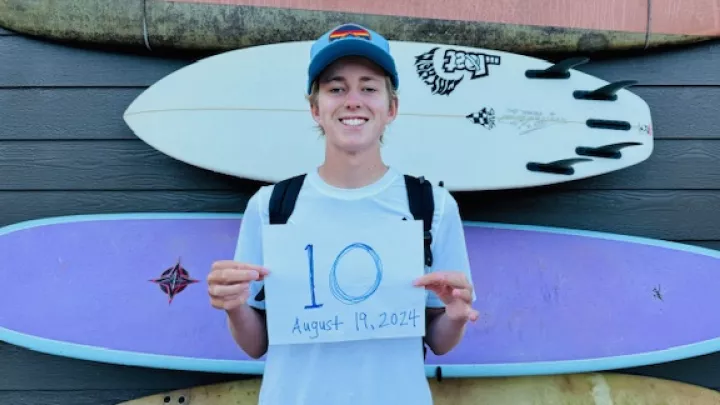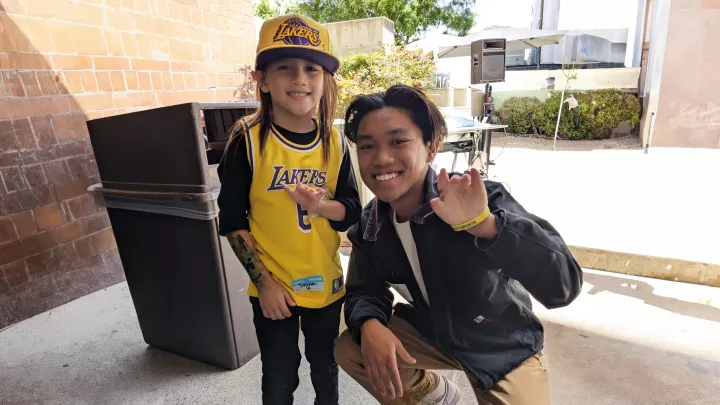
Dr. Jesse Berry (left) sits next to mom Meghan (center) and patient Kayden (right), whom she treated for retinoblastoma and who has supported her following the loss of her home in the L.A. fires.
"A Community That Can’t Burn Down:” Patient Families Support CHLA Ophthalmologist Who Lost Home in L.A. Fires
“It happened so fast,” says ophthalmologist Jesse Berry, MD, Head of the Vision Center at CHLA and Director of the Ocular Oncology and Retinoblastoma Program, recalling the day in early January that changed her life.
She had started the morning preparing to head to CHLA to work on a research paper investigating new strategies to diagnose, monitor, and treat the eye cancer retinoblastoma in the Aqueous Humor Liquid Biopsy Laboratory. She could never have imagined that the patients her work had helped over the years would end up supporting her following the day’s events.
A disaster that started out small
Before Dr. Berry could leave for work that day, wind warnings in L.A. shut down her daughters' school. She decided to work from her home in Altadena for the day to be with 5-year-old Daphne and 3-year-old Lillian.

Around 4 p.m., the house lost power. Dr. Berry explains that this happens occasionally when there are high winds in Altadena, so she wasn’t fazed. “But I was poised to run a big faculty meeting that night, so I had to decide if I should try to run it from my phone or cancel it,” she explains. Dr. Berry also serves as the Vice Chair of Academic Affairs in the Department of Surgery and is the A. Linn Murphree, MD, Chair in Ocular Oncology. She ultimately decided to cancel the meeting, which would turn out to be a fortunate decision. “Because they weren't attending that meeting, some of my colleagues ended up being closer to home when the fire later broke out and had more time to act.”
At this point, the L.A. fires had started and the Palisades Fire was active, but there weren't yet warnings in Dr. Berry’s area. Without electricity, she and her husband, Paul, figured that taking their girls out for dinner would be easier than trying to cook in the dark. But looking out from their home to nearby Eaton Canyon, they saw smoke and watched two helicopters pass overhead.

“My husband said, ‘There’s a fire in the canyon,’” Dr. Berry recalls. “But it was really small at that point. Looking at my phone, there were no warnings or evacuation notices yet.” Still, Dr. Berry and her husband knew that the only way out of their community was through one road in Eaton Canyon, and they didn’t want to end up trapped if the fire spread. They started packing overnight bags and planned to travel somewhere safe where they could wait out the fire for the night. With helicopters already in the area to fight what would eventually become known as the Eaton Fire, it seemed likely that it would be contained by the following morning.
Howling winds and a mountain on fire
“I grabbed a flashlight and packed the bare necessities—including hospital scrubs, because I knew I’d be operating the next day.” Dr. Berry says. “The wind was howling, and through a window, I could see the sky changing from smoke grey to bright orange to red—this fire was moving so fast,” she says. “Suddenly, my husband came into the room and said, ‘Jess, now—you’ve got to get the girls out of here now.’”
Panic set in as Dr. Berry stepped out of the house and saw neighbors running around, packing their cars, and speeding away. Dr. Berry jumped in her car with her daughters and began driving, while Paul packed up a few last items for the family and planned to follow close behind in his own car. “I drove up the cul-de-sac and turned toward the canyon, and the whole mountain was on fire,” Dr. Berry says.
Dr. Jesse BerryThe wind was howling, and through a window, I could see the sky changing from smoke grey to bright orange to red—this fire was moving so fast. Suddenly, my husband came into the room and said, ‘Jess, now—you’ve got to get the girls out of here now.’
As she drove away, a new worry set in. In the hurry to leave, the whole family had forgotten that Paul’s car was behind a closed gate in front of the house that required electricity to open. “There was a moment of panic," Dr. Berry says. “Is he going to be able to hike down the canyon and I’ll pick him up? Is someone else going to drive him down? It felt like there was no time to think straight.”
Fortunately, Paul was able to break through the gate and drive out in his car. The family reunited at a restaurant in Pasadena. Though they had left home before an official evacuation order had been issued for their location, they could see how quickly the fire spread and how lucky they were to get out. “We sat there a little bit shell-shocked and ordered food that we didn’t touch, watching the news as this fire grew and grew,” Dr. Berry says.
A community lost
At about 7 p.m., Dr. Berry heard that helicopters could no longer be brought in to fight the fire because the winds were too strong. “That was the point at which we thought this might actually get out of control and we might lose everything,” she explains.
The family drove to a hotel for the night. “My daughter was asking for her favorite stuffy, which of course I did not think to grab in the hurry to leave,” Dr. Berry says, “And we watched from the hotel window as our town burned down.”
They soon learned from a neighbor who had narrowly escaped the flames that their house was on fire. A couple of hours later, it was confirmed that their home was gone.

By the next morning, Dr. Berry’s daughters’ school had burned down, as did the spots where the girls played tennis, danced, and went swimming. Many of their friends’ houses and businesses were lost, and even their favorite Friday night pizza spot had been destroyed.
“That was life as we knew it,” she explains.
On a personal level, the two most important possessions Dr. Berry lost were gifts from her mentor and friend, the late Dr. A. Linn Murphree. “I was trained by Dr. Murphree, who established the Retinoblastoma Program here at CHLA, and I was his very last trainee,” she explains.
When Dr. Murphree passed in 2022, he gifted his beloved piano to Dr. Berry’s daughters. He had hoped to teach them how to play, but developed Parkinson’s disease late in his life and was unable to do so. “We were so proud that we found a teacher, and soon Lillian, at 3, could play ‘Hot Cross Buns,’ and Daphne could play so much more,” Dr. Berry says.
Dr. Berry explains that Dr. Murphree was also awarded the Stallard Medal, the ultimate honor in their field. “He gifted that medal to me, and it was lost in the fire as well.” Dr. Berry hopes to honor her mentor by one day earning a Stallard Medal herself and having Dr. Murphree’s name engraved on it alongside her own.
Focusing on helping patients
It soon became clear that much of the infrastructure in Altadena had been wiped out and it would be years before their beloved community—a huge portion of their daughters’ childhoods—could be rebuilt.
For now, Dr. Berry’s family stays with a friend in Manhattan Beach. Her daughters attend a school there. “I am always telling my patients’ parents that kids are resilient, and I was replaying those words in my mind while watching my 3-year-old go into a brand-new school, sit down with strangers, and start playing with princess dolls,” Dr. Berry says. “My daughters are surrounded by people who love them, and wherever we go, that’s where home is.”
She hopes to return to Altadena eventually, but thoughts of the recent ordeal are still fresh in her mind. “Those winds howling while my kids were strapped into the car and that fire was growing so fast—that’s a trauma that will stay with me forever,” she says.
In the wake of the destruction, focusing on helping patients at CHLA has grounded Dr. Berry. “Honestly, aside from my connection to the hospital and my patients there, I felt completely untethered in a way that was really strange,” she says. “It feels good to tap into my skillset to take care of children with eye cancer—a skillset that a fire can’t take away from me. There is a community of people whose lives are better for this care, a community that can’t burn down.” That community included people like 9-year-old Kayden and his mom, Meghan.
Dr. Jesse BerryThere is a community of people whose lives are better for this care, a community that can’t burn down.

Patient families step in to help
Meghan first met Dr. Berry when her son, Kayden, was only 6 months old. “Kayden was our first baby, and we brought him in and were told he had a cancerous tumor in his eye and needed to receive chemotherapy,” Meghan says. “But this hospital is absolutely amazing, and I never once felt that I didn’t have a support team. Even in the hardest times, I always knew that Dr. Berry was right there, ready to figure out next steps and cheer us on.”
Over the next three years, Kayden overcame three recurrences of his retinoblastoma, and Dr. Berry’s treatments helped save not only his life, but also sight in one of his eyes—something that’s not always possible with retinoblastoma. Kayden has not had a recurrence of cancer since then and is now 9 years old. “He pitches for his baseball team and snowboards,” Meghan says. “He’s thriving.”
Meghan, mom of CHLA patient Kayden...I never once felt that I didn’t have a support team. Even in the hardest times, I always knew that Dr. Berry was right there, ready to figure out next steps and cheer us on.
It was during a recent family snowboarding trip that Meghan learned about the fires in L.A. and Dr. Berry’s loss. “After everything she had done for us, saving our boy, we wanted to be there for her,” Meghan explains. She immediately contacted family and friends, gathering funds to purchase clothes, toys, and other supplies, writing heartfelt cards of support, and delivering it straight to Dr. Berry.
“The only thing faster than the fire was how quickly this community mobilized to stand behind me,” Dr. Berry says. She immediately began receiving texts and calls from other patient families who had heard about her situation and wanted to help. “One of my patients who is now an adult told me, ‘You stood in trauma with us, we’re going to stand in trauma with you.’”

“These families have provided help with questions I had, assisted in making decisions about next steps, gifted so many clothes, toys and comfort items to our girls, offered basic necessity items for our whole family, and more,” Dr. Berry reflects. “Their kindness has filled my cup in a way that is humbling and hard to explain.”
She says that this overwhelming support has inspired renewed hope about the path forward. “I always knew that helping patients with retinoblastoma was a calling for me, but never in a million years did I think the patients and families that I took care of would turn around and take care of me,” she says. “I’m so grateful.”
Dr. Jesse BerryI always knew that helping patients with retinoblastoma was a calling for me, but never in a million years did I think the patients and families that I took care of would turn around and take care of me. I’m so grateful.


